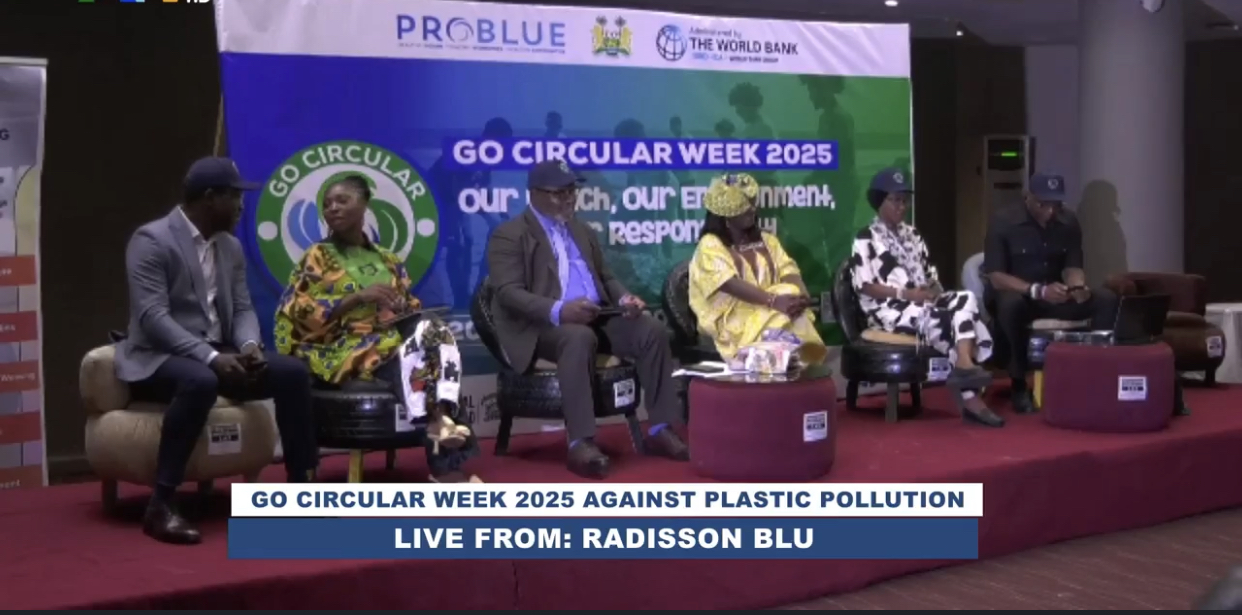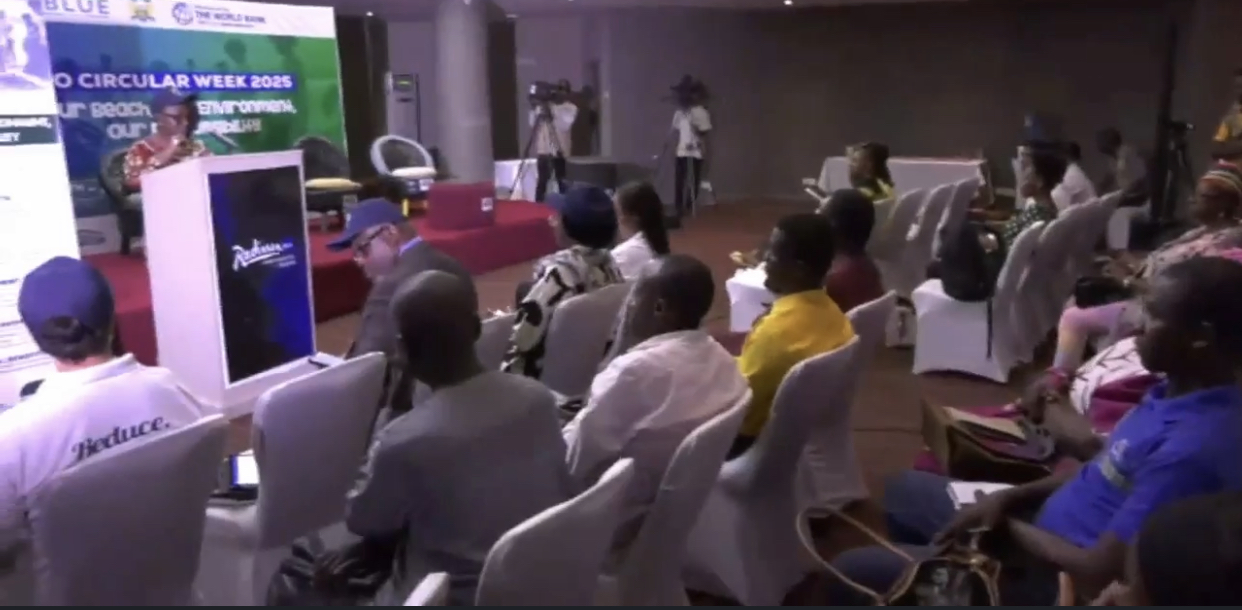On Thursday, February 20, 2025, the Ministry of Finance, in partnership with the Ministries of Tourism and Environment, officially launched “Go Circular Week,” an initiative aimed at eradicating plastic waste.
The Initiative, which specifically aims at advancing circular economy principles and plastic reduction efforts, was themed “Our Beach, Our Environment, Our Responsibility,” and was supported by the World Band and PROBLUE, the Sierra Leone Economic Diversification Project (SLEDP), the Resilient Urban Sierra Leone Project (RUSLP).

The launch event, held at the Radisson Blu Hotel in Aberdeen, Freetown, underscored the urgent need for action against plastic pollution while fostering discussions on sustainable solutions.
Addressing the gathering, Mary Jalloh, Project Coordinator, Sierra Leone Economic Diversification Project (SLEDP), reaffirmed Sierra Leone’s commitment to reducing plastic pollution and promoting circular economy principles.
She recalled that exactly a year ago, on 20th February 2024, the Ministers of Environment, Tourism and Cultural Affairs pledged to commemorate the date annually as “Go Circular Day” in Sierra Leone. “I am happy that we have kept to that pledge and we are here today to go circular again,” she stated.
Addressing the impact of plastic waste, she shared alarming statistics, revealing that 130,000 tons of plastic waste is generated in Sierra Leone annually, with only 7,200 tons properly disposed of. She also noted that the tourism sector alone uses approximately 42 million pieces of single-use plastics per year, with just 6% of those plastics being recycled.
Mary Jalloh highlighted the role of PROBLUE, through the World Bank, in supporting Sierra Leone’s circular economy efforts since 2021. The first phase of this project focused on identifying plastic waste sources and developing sustainable solutions to transform waste into viable commodities, she furthered.
“The goal is to reduce plastic pollution while driving job creation, revenue generation, innovation and skills development. This initiative has the potential to boost key sectors such as tourism and trade,” she noted.

As the project nears completion, she called on the Government of Sierra Leone, particularly the Ministries of Environment, Tourism and Cultural Affairs, to sustain the initiative beyond its initial phase.
Bockarie Kalokoh, Deputy Minister of Finance II, highlighted the Ministry of Finance’s role in encouraging private sector investment in waste management through fiscal incentives and policy support, noting that several industries are already operating within the circular economy framework and that the Government remains dedicated to expanding those efforts.
Drawing from international experiences, Bockarie Kalokoh referenced his visit to Finland, where he witnessed innovative recycling practices transforming waste materials into valuable products. He described such as a wake-up call for Sierra Leone’s private sector to take a more active role in environmental sustainability.
He urged both businesses and citizens to take responsibility for environmental conservation, particularly in protecting Sierra Leone’s beaches from pollution. He assured that the Ministry of Finance stands ready to support any initiative that advances sustainability and the circular economy.
Dr. Louise Twining-Ward, Leader of the World Bank Global Tourism Team, commended Sierra Leone’s commitment to tackling plastic pollution and embracing a circular economy.
“This is not just a day or a week. It is now a movement and you are all part of it,” she told attendees, which included Government Ministers, environmentalists, business leaders and students.
Dr. Twining-Ward outlined four major environmental challenges Sierra Leone faces which include climate change, deforestation, sand mining and plastic pollution.
She reaffirmed the World Bank’s commitment to supporting sustainable development efforts, particularly through initiatives like Go Circular Week. “Sierra Leone has the potential not just to follow but to lead in the fight against plastic pollution,” she stated.
Dr. Twining-Ward stressed that embracing the circular economy is not just about banning plastics but about creating economic opportunities. “By turning waste into wealth, we can support local businesses, create jobs and contribute to economic development,” she said.
Highlighting innovation in recycling, she showcased products made from recycled materials, including crafts created using Coca-Cola can tops and other plastic waste.
Dr. Twining-Ward urged Government agencies, businesses and citizens to sustain the momentum of the “Go Circular” movement. “Clean beaches and a pristine environment are essential for the future of tourism and for the well-being of Sierra Leoneans,” she concluded.
Dr. Kadijatu Grace Ahene Kamara, Deputy Minister of Tourism and Cultural Affairs, called for a collective commitment to environmental sustainability, emphasizing the critical role of Sierra Leone’s beaches in the country’s cultural heritage, tourism industry and economy.
“Our beaches and environment face significant challenges,” she noted. “Pollution, waste and the depletion of natural resources threaten the very ecosystems that sustain us. But there is hope and that hope lies in embracing the circular economy.”
Dr. Kadijatu Grace Ahene Kamara urged Sierra Leoneans to rethink how they use and manage resources by reducing waste, reusing materials and regenerating the environment. She stressed that a circular economy is key to ensuring cleaner communities, protecting natural landscapes and creating economic opportunities.
The Deputy Minister of Tourism and Cultural Affairs encouraged participants to engage with passion and creativity during the seven-day event, emphasizing that safeguarding Sierra Leone’s natural treasures is a shared responsibility.
Launching the ‘Go Circular Week’ 2025, Mima Yema Mimi, Deputy Minister of Environment and Climate Change, highlighted the challenges faced by Sierra Leone in waste management, particularly in urban areas where plastic waste accumulation pose significant environmental and health risks. She underscored the detrimental effects of single-use plastics on ecosystems, public health and climate change, stressing the urgent need for sustainable solutions.
Deputy Minister Mima Yema Mimi outlined initiatives undertaken by the Ministry of Environment and Climate Change to address the plastic crisis, including the development of policies and legislation aimed at plastic waste management. She emphasized the importance of collaboration across sectors and the involvement of stakeholders at all levels in implementing effective strategies.
She reiterated the significance of the Circular Week initiative as a platform for fostering dialogue and cooperation among stakeholders to tackle the plastic pollution challenge.











